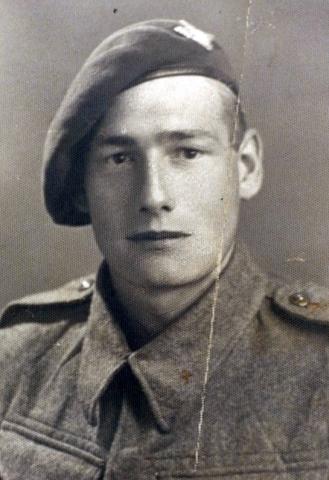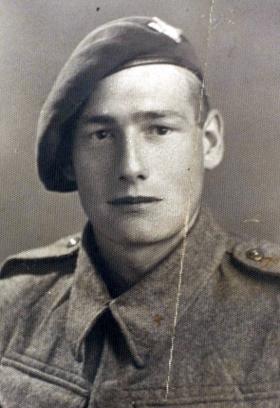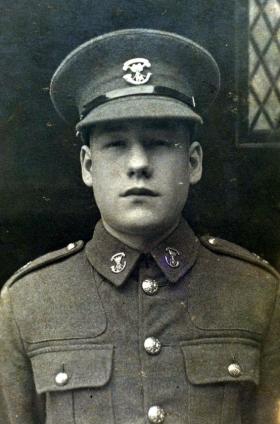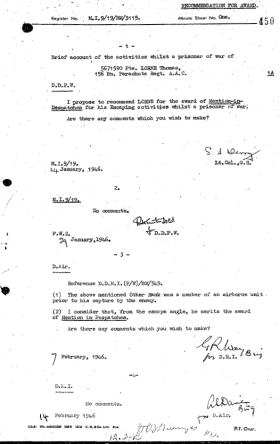Thomas Lorne enlisted into the Somerset Light Infantry in 1937 aged 16.
He later volunteered for airborne forces and undertook his parachute training at RAF Chaklala in North West India. He then posted to 3 Platoon, A Company, the 156 Parachute Battalion (156 Para Bn) in February 1943.
Pte Lorne served with 156 BN in Italy and in November 1943 the battalion returned to the UK to prepare for the invasion of Europe.
He jumped on Operation Market Garden with the second lift into Arnhem on 18 September 1944.
Pte Lorne was wounded by a gunshot to his backside and was taken a Prisoner of War. On 26 September whilst being taken from Oosterbeek to the hospital in Apeldoorn by ambulance, he and two other wounded PoWs escaped.
In John O’Reilly’s book ‘156 Parachute Battalion: From Delhi to Arnhem’, Pte Lorne describes what happened:
‘I was on one of the last ambulances on the road, which was crowded with refugees and bordered by woods, together with Sergeant Thompson and Private Ross, both of my unit. We decided to try to escape. The ambulance was going too fast to jump so we clung onto the side and back until we thought it opportune to drop. When time came we were shot at by the guard on the ambulance but he missed and we managed to get through the throng of refugees and into the woods’
Pte Lorne’s wounds were re-opened during the escape and Pte Ross dressed his wound before the group headed towards the Rhine. On route in a terrible state as all three were badly wounded, they were helped by Dutch farmers who gave food, dressings and a map.
After three days a Dutch guide helped them to get to and cross, the River Lissel. In the village of Zevenaar, six miles south east of Arnhem, they were hidden in a farmhouse along with a Jewish mother and child.
After attempting to cross the Rhine and being separated from Sgt Thompson, Ptes Lorne and Ross had to hide for three weeks in a hallowed out straw stack, where they were joined by an RAF Sgt.
They and other evaders were rounded up and moved to Coldenhove for a planned mass escape ‘Operation Pegasus.’ Whilst out collecting firewood Ptes Lorne and Ross missed the Dutch Resistance who visited the farm to take all the evaders to the rendezvous for Operation Pegasus. They would have to wait a month before trying to escape on ‘Operation Pegasus II.’
Then they went by ambulance to the rendezvous at Wolfswinkel Barn, where they met with 85 other evaders waiting to cross the Rhine. While attempting to reach the river, the group encountered German troops.
Pte Lorne explains:
'Our party, under Major Coke, heard somebody walking in the wood so we laid down by the side of the Track and saw some Germans. They saw us in the obscurity and challenged us with the word: ‘Halt!’ Somebody in our party answered with the English word ’friend’ and we were immediately swept with automatic fire. I crawled away from the track onto another where I banged into Colour Sergeant Cox, paratrooper of 11th Battalion, and a Private of either the 10th or 11th . Four Germans came down the track with flashlights in their hands. I moved to use my Sten but Colour Sergeant Cox reminded me that we were not to use them, so the other Private said : ‘Then I am going to give myself up’.
Sergeant Cox then declared that we might as well all do so. They both went forward with their hands up. I lay still on the ground where I was. The Germans came forward with their torches and saw me. I lay still pretending to be dead. I was fired on with an automatic weapon and I got a bullet through the knee and leg. We were taken out into a field where we were lined up and searched. All those who were wounded lay in the field. The following morning the Germans took us to Hounderloo Hospital.’
Pte Lorne was taken Prisoner of War on 18 November 1944 and after four days in hospital, he was sent to Stalag 6C in Munster, Germany. While on route he wanted to attempt another escape but an officer who was with him had given his word that they would not attempt to escape.
Pte Lorne was liberated in April 1945.
He was award a Mention in Despatches for his ‘escaping activities whilst a Prisoner of War’. It was announced in The London Gazette on 6 June 1946.
The Citation for his Mention in Despatches can be viewed opposite.
More on 156 Para Bn, Operation Pegasus and Pegasus II can be found in '156 Parachute Battalion: From Delhi to Arnhem' by John O'Reilly, published by Thoroton Publishing.
By Wendy George
Read More





Latest Comments
There are currently no comments for this content.
Add Comment
In order to add comments you must be registered with ParaData.
If you are currently a ParaData member please login.
If you are not currently a ParaData member but wish to get involved please register.